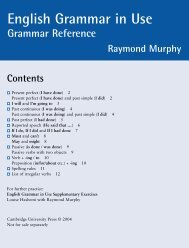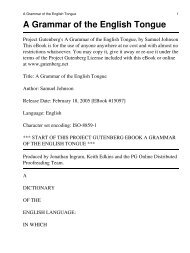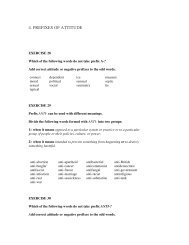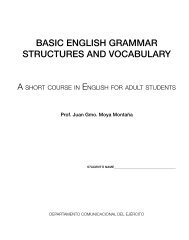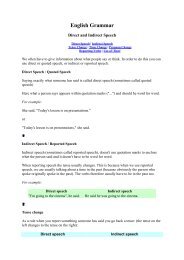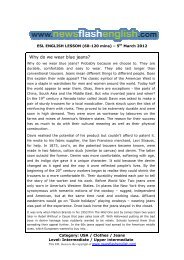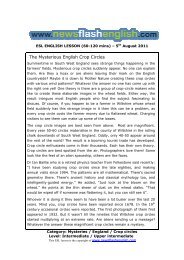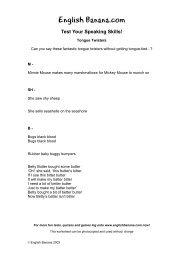TO DOWNLOAD - 75 Pages (928kb - PDF format) - ESL Teachers ...
TO DOWNLOAD - 75 Pages (928kb - PDF format) - ESL Teachers ...
TO DOWNLOAD - 75 Pages (928kb - PDF format) - ESL Teachers ...
Create successful ePaper yourself
Turn your PDF publications into a flip-book with our unique Google optimized e-Paper software.
USAGE/MECHANICSBecause of his background; his v/s sounded likev's.She calls everybody honey.My English professor mentioned my overuse of theword basically in my writing.Any overuse of italics for emphasis causes it to be lessnoticeable and therefore less effective. Use it sparingly.7 SPELLING, WORD PARTS7ASpellingAn important habit to develop, if you are troubled to anyextent with spelling errors, is to look more closely atspelling in your own writing. Declare war on misspelledwords: keep a personal list of words that you have misspelled.Notice that writers misspell words in three fundamentalways:1. They misspell words they also mispronounce:-leaving out a letter, as in "enviorment" or"drasticly." (Correct: environment; drastically)-adding an additional syllable, as in "irregardless"or "athelete." [Correct: regardless; athlete)-scrambling sounds, as in "sangwich" or"irrevelent." (Correct: sandwich; irrelevant)If you are misspelling words because of mispronunciation,look up each word you have any doubts about in thedictionary and take the time to learn the correct pronunciationand spelling. Make a personal list of words in thisproblem category.2. They confuse meanings or choose the wrong word:-there\their\they're; effect\affect; coarse\courseare examples of homonyms that can be confused.-allusion\illusion; alhde\elude; device\devise;counsel\council are examples of words oftenconfused because the writer is not sure of theirmeaning.If you have trouble distinguishing words that have thesame sound or nearly the same sound, learn those words.Use your dictionary, and keep a list of homonyms andsimilar-sounding words that you need to remember.3. They do not depend upon the spelling rules for helpbecause they have not memorized them.Learn the spelling rules. They really do help; for mostpeople, they are lifelong companions.RULE # 1: Words with ie or eiThere is probably not a writer of English alive today whohas not depended at some time on the following oldrhyme:Use i before eExcept after cOr when sounded like aAs in neighbor or weigh.This rule applies only to words in which (he ei/ie combinationis within one syllable, not to words in which theletters are split between two syllables, such as science ordeity. Other exceptions are:ancient Fahrenheit caffeine protein counterfeiteither neither leisure seize weirdRULE #2: Adding prefixesA prefix is a verbal element added to the beginning of aword or root to add to or change its form or meaning(mono-, pre-, dis-, trans-, sub-, ami-). A suffix is an elementadded to the end of a word or root to form relatedwords (-tnent, -ship, -able, -ist, -ism, -ify). A root is thebase or core of a word, the part that contains its basicmeaning, such as disagreeable or overrated. See WordParts at end of this section.When you add a prefix such as pre- or un- to a root orbase word such as paid, simply attach prefix and roottogether without any changes to either one, as in prepaidand unpaid.Base words, such as paid, can stand alone; roots requirethe addition of a prefix or suffix before they becomewords, an example being the root -cess in incessant.If the prefix ends with the same letter that begins theroot, include both letters, as in misspell, disservice, andillegal.RULE #3: Final eA large number of words end in silent e, such as time andrecite. Remember that the e is not pronounced. The rulehas two parts:1, When you add a suffix that begins with a vowel, suchas-en, -ize, -ess, -ism, -able, -ible, -ic, -1st, -ance,-age, -ing, -ed, you drop the final e.EXAMPLE:word + suffix = new wordwrite + -er = writeramuse + -ing = amusinghope + -ing = hoping2. When you add a suffix that begins with a consonant,such as-ward, -ment, -ry, -ship, -ful, -ness, you retain thefinal e.EXAMPLE:word + suffix = new wordforce + -ful = forcefullife + -like - lifelikeexcite + -ment = excitementAs with all rules, the Final e rule has exceptions. Hereare a few important ones:argument convention dulyintervention judgment truly8




